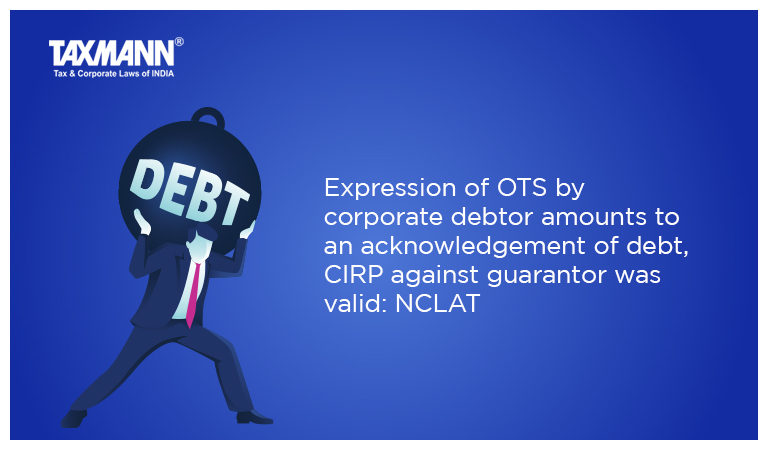Expression of OTS by corporate debtor amounts to an acknowledgement of debt, CIRP against guarantor was valid: NCLAT
- Blog|News|Insolvency and Bankruptcy Code|
- 3 Min Read
- By Taxmann
- |
- Last Updated on 8 September, 2022

Case Details: Bijay Kumar Agarwal v. State Bank of India - [2022] 141 taxmann.com 546 (NCLAT-New Delhi)
Judiciary and Counsel Details
-
- Justice Ashok Bhushan, Chairperson, Dr Alok Srivastava & Ms Shreesha Merla, Technical Member
- Soumya Dutta, Adv. for the Appellant.
- Joy Saha, Sr. Adv., Joydip Mukherjee, Ashwini Kr. Singh & Kuldeep Mallick, Advs. for the Respondent.
Facts of the Case
In the instant case, the principle borrower had availed financial facilities from the respondent – financial creditor and the appellant-corporate guarantor executed a deed of guarantee. On 10.01.2014, the account of the principle borrower was declared as a Non-Performing Asset (NPA).
Consequently, the financial creditor, by a letter dated 20.08.2014 invoked a bank guarantee against the corporate guarantor and called upon the corporate guarantor to make payment. Thereafter, the financial creditor filed an application u/s 7 of the IBC on 09.03.2018 against the corporate guarantor.
The NCLT admitted said application by the impugned order. Thereafter, an appeal was filed to the National Company Law Appellate Tribunal (NCLAT) against the order passed by the NCLT.
The corporate guarantor alleged that the application filed by the financial creditor was time-barred and there was no acknowledgement of the debt by the corporate guarantor. Therefore, the extension of limitation shall not be allowed.
Further, the corporate guarantor contended that the principle borrower vide its letters dated 19.02.2016 and 29.03.2016 clearly expressed willingness to pay all the dues on the basis of a one-time settlement, which could be treated as acknowledgement within the meaning of section 18 of the Limitation Act, 1963.
The NCLAT observed that the liability of the corporate guarantor was co-extensive with the principle borrower and, therefore, letters issued by the principle borrower for One-Time Settlement (OTS) were a clear acknowledgement of debt on part of the corporate guarantor.
NCLAT Held
The NCLAT held that since acknowledgement was made by the principle borrower within a period of three years from the date of account being declared NPA, a fresh period of limitation had started from the date of such acknowledgement. Thus, the application filed by the financial creditor u/s 7 of the IBC on 09.03.2018 was within the limitation period of three years from the last date of acknowledgement.
List of Cases Reviewed
-
- Order of NCLT – Kolkata in I.A No. 346/KB/2018, dated 14 – 12 – 2021 (para 27 ) affirmed.
- Laxmi pat surana v. Union of India [2021] 125 taxmann.com 394/166 SCL 318 (SC) (para 26) followed.
- J.C. Budhraja v. Chairman, Orissa Mining Corpn. Ltd. [2008] 2 SCC 444
- Tribhuvanshankar v. Amrutlal [2014] 2 SCC 788
- Shridhar Issar v. Bharnobari Tea & Industries AIR 2012 Cal. 71
- State of Maharashtra v. Hindustan Construction Co. Ltd. [2013] SCC OnLine Bom. 181
- Holdings Ltd. v. Bombay Oxygen Corpn. Ltd. [2017] SCC OnLine Bom. 1806 (paras 10,12,14,16 and 18) distinguished.
List of Cases Referred to
-
- Sesh Nath Singh v. Baidyabati Sheoraphuli Co-operative Bank Ltd. [2021] 125 taxmann.com 357/166 SCL 507 (SC) (para 8)
- Dena Bank v. C. Shivakumar Reddy [2021] 129 taxmann.com 60 (SC) (para 8)
- J.C. Budhraja v. Chairman, Orissa Mining Corpn. Ltd. [2008] 2 SCC 444 (para 10)
- Tribhuvanshankar v. Amrutlal [2014] 2 SCC 788 (para 12)
- Shridhar Issar v. Bharnobari Tea & Industries Ltd. AIR 2012 Cal. 71 (para 14)
- State of Maharashtra v. Hindustan Construction Co. Ltd. 2013 SCC Online Bom. 181 (para 16)
- Holdings Ltd. v. Bombay Oxygen Corpn. Ltd. 2017 SCC Online Bom. 1806 (para 18)
- Jignesh Shah v. Union of India [2019] 109 taxmann.com 486/156 SCL 542 (SC) (para 19)
- Laxmi Pat Surana v. Union Bank of India [2021] 125 taxmann.com 394/166 SCL 318 (SC) (para 25).
Disclaimer: The content/information published on the website is only for general information of the user and shall not be construed as legal advice. While the Taxmann has exercised reasonable efforts to ensure the veracity of information/content published, Taxmann shall be under no liability in any manner whatsoever for incorrect information, if any.

Taxmann Publications has a dedicated in-house Research & Editorial Team. This team consists of a team of Chartered Accountants, Company Secretaries, and Lawyers. This team works under the guidance and supervision of editor-in-chief Mr Rakesh Bhargava.
The Research and Editorial Team is responsible for developing reliable and accurate content for the readers. The team follows the six-sigma approach to achieve the benchmark of zero error in its publications and research platforms. The team ensures that the following publication guidelines are thoroughly followed while developing the content:
- The statutory material is obtained only from the authorized and reliable sources
- All the latest developments in the judicial and legislative fields are covered
- Prepare the analytical write-ups on current, controversial, and important issues to help the readers to understand the concept and its implications
- Every content published by Taxmann is complete, accurate and lucid
- All evidence-based statements are supported with proper reference to Section, Circular No., Notification No. or citations
- The golden rules of grammar, style and consistency are thoroughly followed
- Font and size that’s easy to read and remain consistent across all imprint and digital publications are applied



 CA | CS | CMA
CA | CS | CMA
